Bass CDs
Barry Stephenson News – Jamison Ross Set To Deliver All For One

Grammy-Nominated Jamison Ross Set To Deliver All For One, Featuring Bassist Barry Stephenson
Whereas Jamison Ross’ GRAMMY®-nominated, vocal-heavy 2015 debut disc, Jamison shocked some listeners who knew him primarily as a drummer, especially after he won the 2012 Thelonious Monk Institute of Jazz International Drum Competition, his sophomore disc, All For One, scheduled for release on January 26, 2018 via Concord Jazz, will surely solidify his reputation as one his generation’s brightest vocalists and drummers. WBGO.org has the track premiere for “Don’t Go to Strangers” here.
All For One boasts a cast of musicians of whom Ross has developed a strong rapport from touring –
Pianist Chris Pattishall, guitarist Rick Lollar (both of whom played on the 2015 debut), bassist Barry Stephenson, and Cory Irvin on Hammond organ and Fender Rhodes. Ross is particularly enthusiastic with the addition of Irvin on the organ because he likens that instrument to an orchestra that would accompany jazz singers like Frank Sinatra or Billie Holiday. “When I first added the organ in my band, I was inspired by Marvin Gaye’s 1964 LP, When I’m Alone I Cry,” Ross explains. “[On that album] he sings jazz standards with a full orchestra. The organ is like my orchestra. The way I use the organ is a very calculated form. It produces the atmosphere throughout the record. And that parallels with how I grew up in church. The organist pulls the emotion out of every tune.”
The disc perfects the intoxicating chemistry of the 29-year-old’s debut, which intermingled blues, jazz, R&B and soul effortlessly.
“All For One is literally the second chapter,” Ross explains after comparing the success of his debut and the world tour in support of that album as a “whirlwind of smiles and gratitude.” “There’s no deep way to view All For One other than it being the second chapter of me revealing myself as a man who loves as a father, husband, friend, and brother and as an artist who brings that love to other people while receiving love from my audience.”
For sure, love is a recurring theme on All For One as the material touches on both the romantic kind and the socio-political aspect of love that calls for unity among a diverse and, at times, a divisive community. The album also finds the Jacksonville, Florida born and now New Orleans-based Ross plowing into the rarefied areas of blues and R&B that seldom gets investigated by his peers.
Ross begins the disc with mighty shout out to the Crescent City’s R&B legacy with the vivacious make of “A Mellow Time,” a 1966 tune written by Allen Toussaint and made famous by Lee Dorsey. “I’m the biggest Lee Dorsey fan and I’m a huge Allen Toussaint fan,” Ross enthuses. “A lot of tunes like this taught me how to write. I want to write songs that have stories inspired by love.
The title track – “All For One” – is another Big Easy-based song; it’s a rare groover written and recorded in 1993 by Wilson Turbinton, better known as Willie Tee. The lyrics’ plead for love takes on both amorous and socio-political overtones that spills over to other songs on the album, such as Ross’ splendid rendition of Mose Allison’s 1968 classic, “Everybody’s Cryin’ Mercy.” “It’s a rough time in America. It’s that simple,” Ross explains. “I know a lot of Mose Allison’s music. I like the way that he could talk the blues. He didn’t sing the blues; he talked the blues. That song has such a pivotal message for where we are right now as a nation.”
Fats Waller’s 1936’s “Let’s Sing Again,” which closes All For One is another old-school gem. On Ross’ makeover, his sanguine singing soars atop of Irvin’s churchy organ accompaniment – a strategic move that tips its hat pays to Waller’s church roots in New York as well as Ross’ background in Jacksonville, Florida, where he grew up singing in his grandfather’s church.
Ross also delves into jazz standards on All For One with his haunting reading of “Don’t Go to Strangers,” a ballad written by Arthur Kent and Dave Mann and made famous in 1960 by Etta Jones, and his alluring version of Ira Gershwin and Kurt Weill’s 1941 classic, “My Ship,” which gains a subtle country vibe thanks for Lollar’s guitar yawns. “I don’t do a lot of jazz standards. The covers that I do come more from the obscure blues realm,” Ross says. “But I honestly love singing ‘Don’t Go to Strangers.’ I sang it at NPR’s Jazz Night in America tribute to Rudy Van Gelder Concert. That song taught me a lot about phrasing, which I used on ‘My Ship.’”
All For One contains some exquisite originals too.
The gentle, blues-tinted ballad “Unspoken” is a song Ross penned for his wife, Adrienne, to express his enduring love for her while he’s on the road. The jaunty “Call Me” is another original written with Ross’ wife in mind. The backstory of “Call Me” involves his wife phoning him while he was in the middle of crafting an infectious boogaloo drum groove. Instead of getting frustrated by the interruption, Ross allows the phone call from his wife to become an inspirational force. Ross dedicates the melancholy “Away” to his daughter, Jazz Aubrielle as he conveys missing her while he’s constantly on the road and reminding her that his love for her is unending.
The soothing bossa nova, “Safe in Arms of Love,” co-written with Lollar and Joshua Starkman, and the somber, wordless vocalese ballad “Tears and Questions” find Ross turning his attention back to more socio-political issues. Both songs were written while he was touring Australia with Nicholas Payton then receiving news of the 2016 police killing of Alton Sterling in Baton Rouge. Ross’ soul-infused “Keep On” offers encouraging balm in the face of tragic upheaval.
Besides the wordless “Tears and Questions,” All For One contains no instrumentals like its predecessor; nor does it explicitly showcases Ross’ virtuosity as a drummer. “I started touring and playing on a constant basis with my band. That didn’t happen before I made my first record,” Ross explains. “So playing instrumentals was part of my development then. I feel now, I don’t have to prove that I can play instrumentals anymore nor do I have to prove my drumming skills. Recording instrumentals is not indicative to what my artistic concept has grown into. This album is a result of a personal revelation that we all have the capacity to love with empathy in a deeper way. The love you need comes from me and the love I need comes from you. All for one, one for all.”
Pre-order:
Amazon: found.ee/JamisonAMZ-j
iTunes: found.ee/JamisoniTunes-j
Website: found.ee/JamisonWeb-j
Bass CDs
Reissue: Geddy Lee’s My Favourite Headache and Alex Lifeson’s Victor
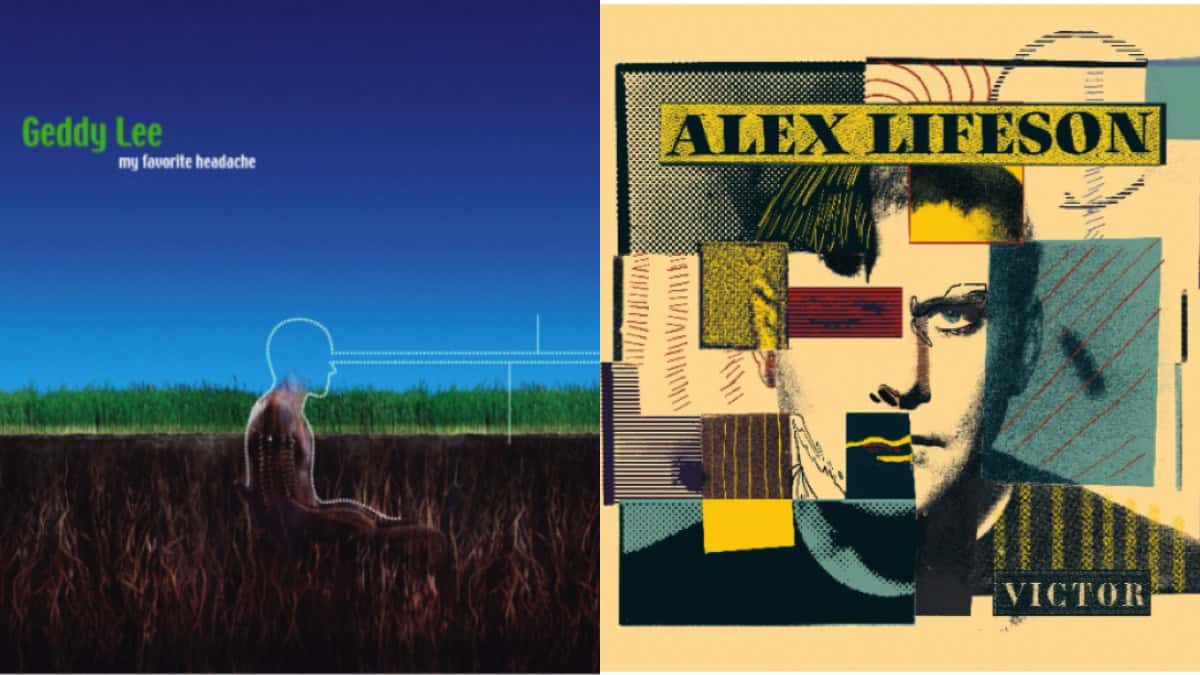
In an exciting announcement for Rush fans and rock enthusiasts alike, Anthem Records in Canada and Rhino Records will reissue the first-ever solo albums of Alex Lifeson and Geddy Lee. Lifeson’s 1996 album Victor and Lee’s 2000 offering My Favourite Headache will be re-released on August 9, 2024, in various formats, including a range of vinyl configurations.
My Favourite Headache, Geddy Lee’s only solo album to date, was initially released on November 14, 2000. This reissue marks its first vinyl pressing since a limited-edition Record Store Day exclusive in 2019. The fourth side of the album features two instrumental mixes. Produced by Lee, Ben Mink, and David Leonard, the album includes contributions from Mink and drummers Matt Cameron (Soundgarden/Pearl Jam) and Jeremy Taggart (Our Lady Peace).
Victor, originally released on January 9, 1996, marks Alex Lifeson’s solo debut. Lifeson took on the roles of songwriter, producer, and mixer for this album. For the first time, Victor will be available on vinyl, featuring a complete remix by Lifeson himself to enhance the audio quality. The fourth side of the album includes four instrumental tracks previously exclusive to Lifeson’s website. Guest artists include lead vocalist Edwin from I Mother Earth, Primus bassist Les Claypool, and Canadian powerhouse vocalist Lisa Dalbello. The 15-song collection is paired with striking 2024 reimagined artwork by Fantoons Animation Studios.
For more details on the Geddy Lee reissue and to preorder, https://lnk.to/MyFavouriteHeadache
For more details on the Alex Lifeson reissue and to preorder, https://lnk.to/AlexLifesonVictor
Bass CDs
New Album: Ben Wolfe, The Understated
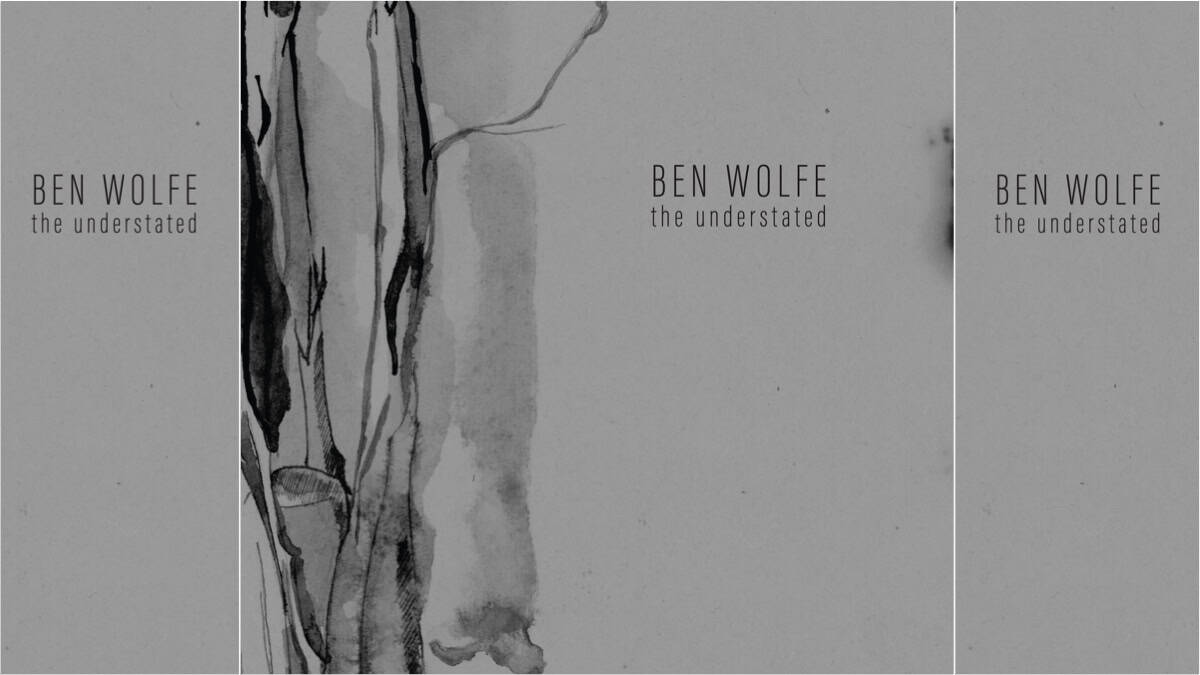
Acclaimed bassist and composer Ben Wolfe is thrilled to announce the August 9, 2024 release of The Understated.
This evocative new album features a collection of new original compositions by Wolfe paired, with re-imaginings of some of the composer’s classic material, with a particular emphasis on the ballad song-form. The album features ten tracks, five of which are ballads – a bold move for any composer – Wolfe creates a cohesive narrative here that challenges the listeners perception of the classic ballad. The Understated features Wolfe alongside artists who make up the very frontline of modern jazz, including pianist Orrin Evans, tenor saxophonist Nicole Glover, drummer Aaron Kimmel, guitarist Russell Malone and pianist Sullivan Fortner.
Wolfe has always been drawn to finding beauty in subtlety. He perceives a certain tranquility and elegance in the Coltrane Quartet, Louis Armstrong’s Hot Fives and Sevens, the legendary Miles Davis bands and rhythm sections, and the music of Charlie Parker. While he, of course, revels at the immense world-building energy of this music, it’s the “other side” – the elusive, magical aspect that endlessly captivates him – the understated. The composer draws inspiration most from the ensemble work of these hallmark jazz ensembles. Despite the individual parts being extraordinarily beautiful on their own, the musicians in these archetypal ensembles play only what is needed to serve the music, paying particular attention to the band-sound more-so than their individual sound. The Understated embodies this ethos with a tremendously impactful ensemble-oriented approach.
Wolfe sought to continue the thread started by “Lullaby in D” from his previous critically acclaimed release Unjust. Wolfe indicates, “Something about that take was so perfect to me. It had been brought to life, and it had that ensemble thing.” Wolfe assembled the quartet who recorded “Lullaby” (including longtime collaborator Orrin Evans, as well as recent frequent collaborators Aaron Kimmel and Nicole Glover) and two very special guests, Russell Malone and Sullivan Fortner. The recording process took place in one room with no headphones or isolation booths, further emphasizing the group’s collective awareness.
This record succeeds in bringing Wolfe’s expansive music to life through extremely conscientious group playing. Nothing is forced or pushed; everything that needs to be stated is stated. The single from the album, “Waltz,” encapsulates the spirit of the project. Wolfe says, “I view albums like a complete painting, so singles have been difficult for me. This song is very much in the spirit of the whole but doesn’t give away the record.” The piece features a sentimental melody delivered with grace by tenor saxophonist Nicole Glover, before Glover and Evans embark on stirring solos dancing in and out of the tune’s harmony.
Other new original compositions featured here include “Ballad in B”, which perhaps best demonstrates the group’s stunning cohesion. This tune is a refreshing diversion as it features a serene repeated melody without overt melodic improvisation. The following track, “Anagram”, begins with Kimmel’s rhythmic refrains and a unison melody played by Glover and Wolfe and is a true ensemble piece. On this track, Wolfe shines with a lyrical solo. The moody short interlude “So Indeed” is a lyrical masterwork that leaves the listener wanting even more. “Beautiful You” features master guitarist Russell Malone on the track’s melody. The emphasis here on restrained lyricism is a prime reminder of the old adage “it’s not the notes you play, it’s the notes you don’t play”. Each pocket of space in between melodic moments leaves room for the listener to breathe deeper and deeper into the song. The driving “Triangle Man” features fantastic improvisation from Glover and Kimmel. The tender “Barely Spoken” concludes the album with a feature for pianist Sullivan Fortner.
The album also weaves in references to Wolfe’s past works, creating a personal musical universe. “The Poet Speaks” is the opening track on his first record, 13 Sketches. “Occam’s Razor” was composed years ago for a collaboration with a choreographer and painter, and was a much different composition in its original form. “Love Is Near” was originally found on The Whisperer. With ballads in particular, Ben uses voicings and sounds that represent certain things to him, intentionally referencing his other compositions to generate connections between his songs.
Wolfe’s tremendous compositions on this album are also influenced by the group of musicians that he assembled for this release. Wolfe remarks “One of the things these five musicians share in common is that not only are they true ensemble players, they will always play something unexpected and special.” Listeners will find calm and beauty within the ensemble performances throughout The Understated.
Visit online at benwolfe.com/
Bass CDs
New Album: Orlando le Fleming, Wandering Talk
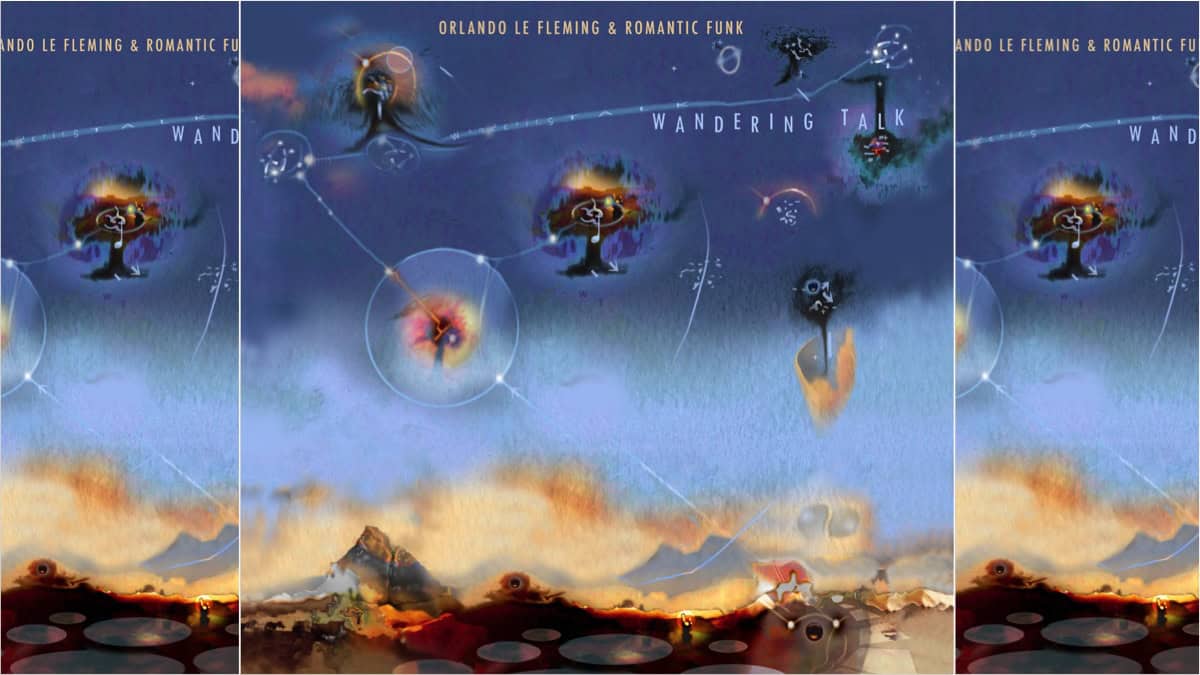
Bassist, band leader, and composer Orlando le Fleming continues to make music that crosses genres as readily as he crosses the Atlantic, with this new album ‘Wandering Talk’, to be released physically on 23rd August via the UK’s premiere jazz label, Whirlwind Recordings.
After 20 years in New York City, he’s back in his native UK, forging new pathways and renewing old partnerships. His love for the acoustic tradition continues unabated alongside his deep affection for the robust, muscular electric fusion that emerged in the 1980s, and he has received critical acclaim from media including The Guardian, Financial Times, Jazzwise, and All About Jazz among others. He has also toured and recorded with some of the world’s greatest jazz musicians including Branford Marsalis, Kurt Rosenwinkel, Antonio Sanchez, Ari Hoenig, and Wayne Krantz.
The Romantic Funk project was born in New York’s legendary 55 Bar to explore that legacy: now the new album ‘Wandering Talk’ builds on the critical acclaim generated by ‘The Unfamiliar’ (2020), building on the framework with a set of collaborators that brings together London and New York, past and present, acoustic, and electric, and merges it all into a spectacular whole.
Following the same principles that served the project in NYC, le Fleming booked four Friday nights at London’s renowned Vortex Club to workshop the music that would become the album, with a rotating cast of players which he honed down into the final line-up. Old London friends Tom Cawley (piano/keys) and James Maddren (drums) completed the rhythm section. New acquaintance Nathaniel Facey was picked from the ranks of the UK’s brightest young saxophone players. NYC stalwart Philip Dizack flew in from the US to play trumpet and reaching back to Orlando’s school days and forward to his own family, one-time classmate Chris Martin (Coldplay) and his own daughter Nadia combined to provide vocals on a special setting of Rumi’s poetry.
As before, the music combines fusion’s flash and fire with a contemporary sensibility. This time, Orlando’s questing spirit sends his superb band forward to investigate fresh areas of creativity in dynamic and texture.
Visit online at orlandolefleming.com
Bass CDs
Album: John Entwistle, Rarities Oxhumed – Volume Two
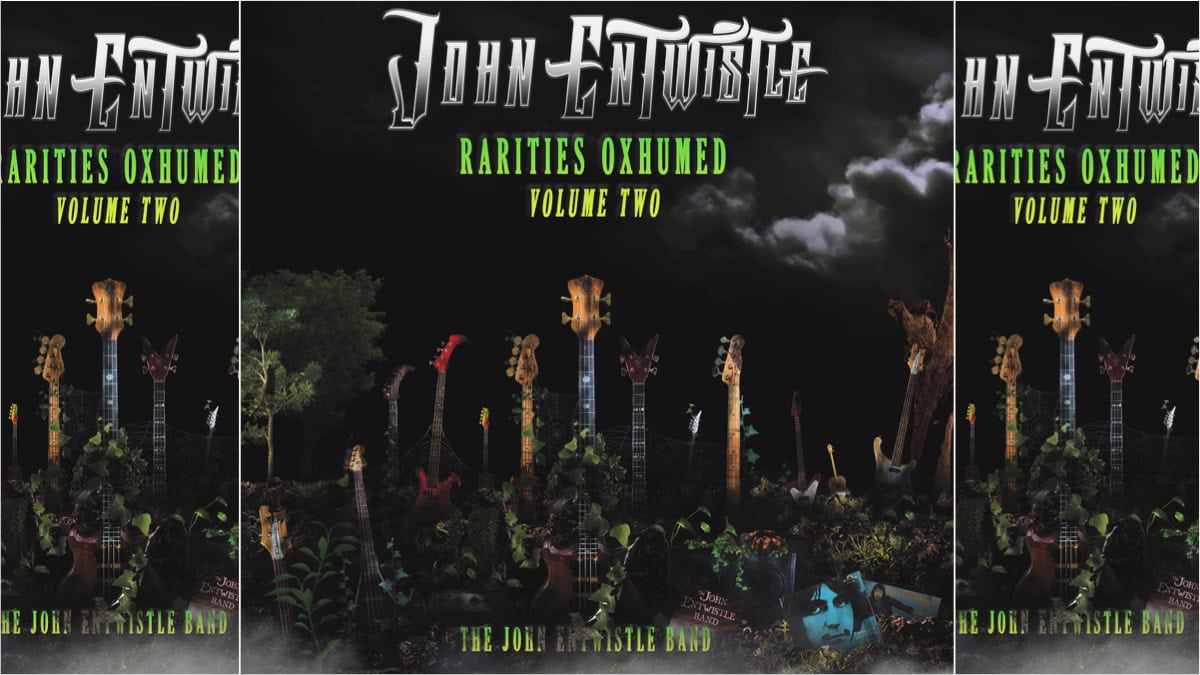
Album: John Entwistle, Rarities Oxhumed – Volume Two
Rarities Oxhumed – Volume Two is the second of the series of posthumous releases coming from John Entwistle.
Rarities Oxhumed – Volume Two is a compilation that was curated by drummer Steve Luongo, who served as John Entwistle’s producer, bandmate, business partner and good friend for many years. As Luongo states, “When I agreed to do two volumes of John Entwistle rarities, I knew volume two had to be even better than volume one. It is!” The collection of songs on Volume Two are from his years with the John Entwistle Band and include re-mastered versions of studio tracks including “Endless Vacation”, alternate mixes of tracks like “Sometimes”, and live tracks including The Who cuts “Real Me”, “Long Live Rock” and an epic version of “Young Man Blues”. The latest preview track to be released is the Who cut “Had Enough.”
Listen to “Had Enough” here: push.fm/ps/hadenough
Rarities Oxhumed – Volume One was quickly embraced by longtime fans as it featured gems like “Bogey Man” featuring Keith Moon, “Where You Going Now” (demo for the Who), and a raw live version of “Trick of the Light” recorded during the John Entwistle Band’s final tour in 2001. Deko Entertainment is thrilled to have been able to bring both volumes of this unearthed music of John Entwistle to the fans and forever solidify him as one of the greatest rock musicians ever.
For more information, visit online at dekoentertainment.com/john-entwistle
Bass CDs
Album Review: Mark Egan, Cross Currents
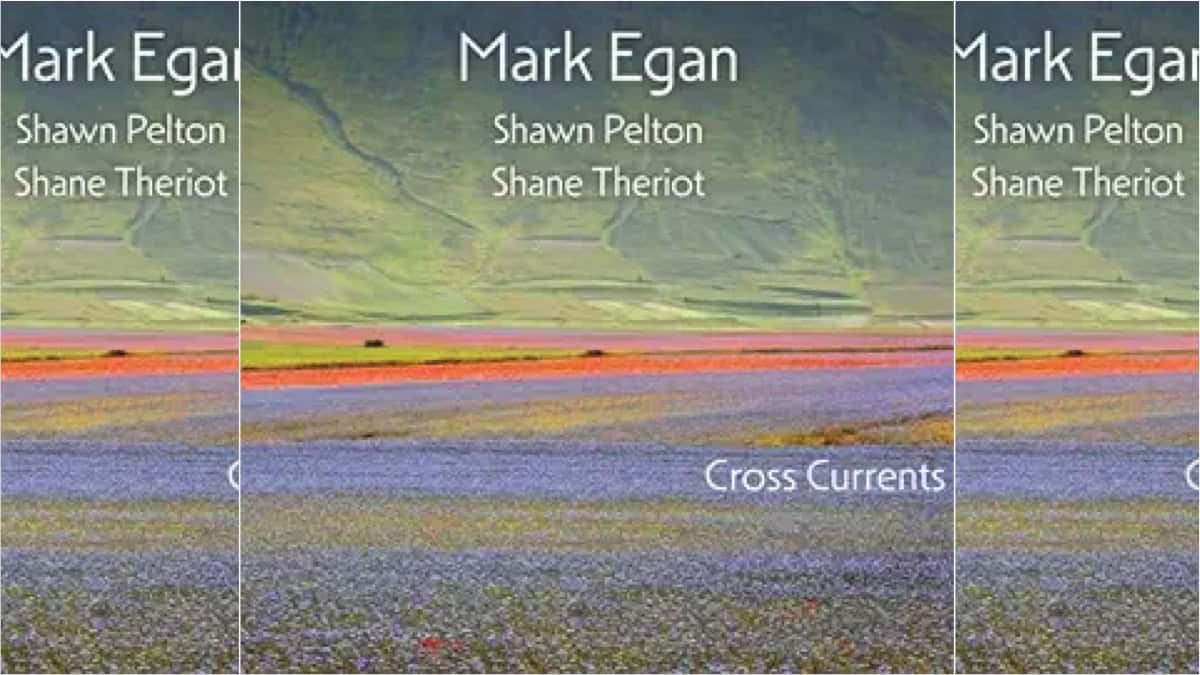
Mark Egan, Cross Currents…
It is exciting every time I get a new album from Mark Egan as he is such an amazingly versatile player and I never know what to expect (except for excellent artistry!) In his latest release, Mark has teamed up with Shawn Peyton on drums and Shane Theriot on guitar to bring us “Cross Currents”.
This collection of eleven tracks transports me to the Gulf Coast (New Orleans specifically). Mark’s fretless basses lay down a solid groove and lots of juicy solo work for this rootsy collection of funk, ambient, swamp-rock, second line, ballads, Cajun and even Indian Raga.
This trio is super-tight and the musicianship is flawless as each member has ample opportunity to shine. Even though each player is very talented in their own right, I feel that the collective energy is greater than just the sum of the players on this album. Each musician contributed to composing music for this project but the lion’s share are Mark’s original pieces.
I spent the summer of 1981 in New Orleans and this wonderful music takes me back to those fond memories. I participated in a wacky raft race on Lake Ponchatrain and this opening track elicits images of fun, sunshine, music, and great food.
This is another superb album that everyone will enjoy. Get your copy today! Cross Currents is available online at Amazon.com. Visit Mark online at markegan.com.











